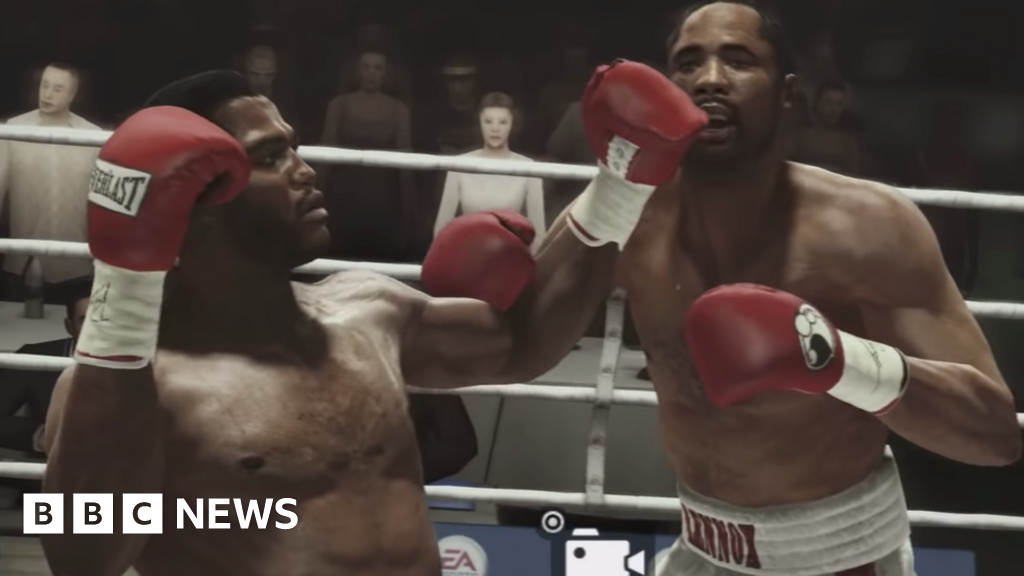The punch came in the seventh round: a stinging uppercut from Joe Frazier to the jaw of Lennox Lewis.
The former British world champion tried to regain his feet but stumbled back and was counted out by the referee.
Smokin’ Joe raised his glove in victory as thousands of fans watching at home shared the historic moment.
In fact, everyone was at home – including the boxers, who, of course, have long been retired.
Lewis himself was watching from self-isolation. He tweeted: “Congrats to Smokin’ Joe on a big win. He caught me with a great shot that… I was never really able to recover from. Hats off to him!”
The event was the latest virtual fight organised by the World Boxing Super Series (WBSS).
Since coronavirus forced the company to cancel all its real-life events, it’s turned to gaming to keep fans entertained with the greatest-ever heavyweights pitted against each other in a tournament series streamed online.
Reinventing the wheel
The fights are played using computer-versus-computer simulations from the 2011 Electronic Arts game Fight Night Champion.
Boxing fans all over the world have been tuning in, with the first two contests viewed by nearly half a million people, according to the company.
Co-founder and promoter of the WBSS (and now the eWBSS), Kalle Sauerland, says he and the industry are desperate for the pandemic to pass so he can get back to filling arenas again. But the German-born, London-bred promoter says he’s been blown away by the reaction to his e-sports experiment.
“It’s been huge success so far and it’s growing,” he said. “We’ll still be boxing promoters at the end of all this but I think now is the time to reinvent the wheel a bit to keep people entertained.”
Wheels are being reinvented all over the world, across many different sports.
Formula 1 streamed its first ever Virtual Grand Prix, with full pundit and commentary team. Celebrities including singer Liam Payne and cyclist Sir Chris Hoy played against each other and in teams from their own homes, in isolation.
Television outlets are also getting in on the action. In the US, more than 900,000 viewers tuned in for the inaugural eNascar iRacing Pro Invitational Series on Fox Sports. The network has said it will host an entire series of stock-car races, replacing the ones lost due to the pandemic.
For e-sports regulars like Johan Sundstein it’s an amusing turn of events. The 26-year-old, known online as N0tail, tops the rankings as the most successful e-sports player of all time, netting almost $7m (£5.85m) so far in prize money for playing Dota 2.
“We’ve had this eternal conflict of sports versus e-sports and we’ve been accused of copying from the sports scene, and now we see the sports world taking a note out of the e-sports world, which I find kind of funny.”
Sundstein is currently in isolation at his home in Portugal but the Danish professional is having to adapt to the circumstances since a competition was cancelled at the last minute due to the virus.
“It was such a bitter thing that they cancelled our major tournament,” he said. “I personally had an extended break and I was really excited to get to this one and it just got taken away from me in front of my nose. I’m dearly going to miss it.”
The e-sports star has made his name and riches playing for crowds all over the world and is now trying to get into streaming to keep busy and connect with his fans. He admits that for the next few months, at least, “that’s where all the viewers are”.
The big e-sports companies know this, too, and already big-prize purse events are being set up to make the most of the near-global lockdown.
Popular basketball game NBA 2K is hosting its first ever “3-on-3” tournament where players can participate online for a prize pool of $25,000.
Games streaming in general has experienced an explosion in popularity. On Twitch, the largest game platform, week-on-week engagement is growing, with average concurrent viewers now more than 1.5 million, according to Twitch Tracker.
Amy Bayliss, known by her fans as Bamyleaf, streams four days a week on Twitch and says she’s noticed an upturn not only in viewer numbers but also in conversation when she’s online.
“There’s a lot of people turning to live streaming right now because they’re home and bored and everyone’s feeling isolated,” she says. “But it’s not just about tuning in to see decent gameplay, it’s just as much belonging and community.”
The number of people actually playing games is also growing. On Steam, the largest PC gaming platform in the world, a new record was reached on Sunday, with 20.7m players actively gaming or chatting on the platform at the same time.
With the boom come concerns from some quarters about how much bandwidth is being used for gaming and the strain it puts on internet networks. Gaming is relatively light on internet usage but downloading games themselves can be very bandwidth-heavy.
To combat this, Playstation recently restricted download speeds across Europe, and other companies, including Twitch, have also reduced the quality of streams in order to help internet service providers cope with the overall strain they are now under.
The gaming industry, it seems, is working hard to ride the wave of popularity while minimising the impact on services the boom is having.
